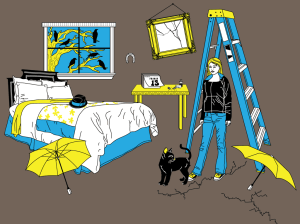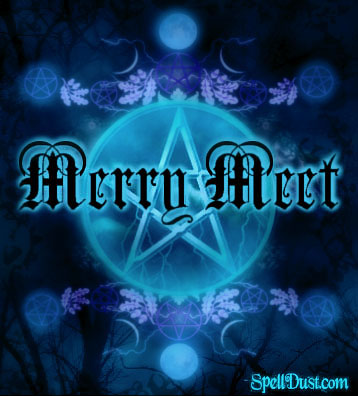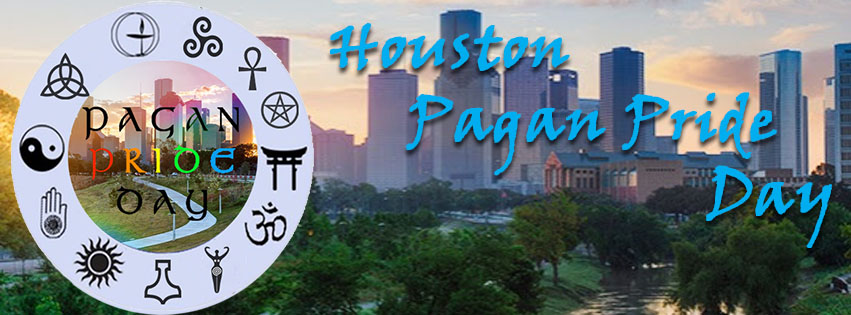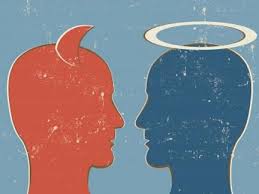 One of the questions that people ask (or silently wonder about), especially in the ‘good ol’ South’ is something along the lines of, ‘if you don’t believe in the Bible, then where do you get your morals/ethics from?”, or ‘how do you know the difference between right and wrong?’.
One of the questions that people ask (or silently wonder about), especially in the ‘good ol’ South’ is something along the lines of, ‘if you don’t believe in the Bible, then where do you get your morals/ethics from?”, or ‘how do you know the difference between right and wrong?’.
We posed this question to our group, in the hopes that their thoughts and replies might shed some light on this area.
Raven:
Adsartha:
The core values I have came to greatly respect are of the Yogi lifestyle. They simply are:
- AHIMSA = non-violence
- SATYA = truthfulness
- ASTEYA = non-stealing
- BRAHMACHARYA = faithfulness
- APARIGRAHA = non-greed
- AHIMSA applies to everything. It is the first and may be the most important principle.
 – How we treat all other beings
– How we treat all other beings
– How we treat our own bodies and minds
– How we think and what we think about
– How we talk and what we talk about
– How we eat and what we eat.
SATYA is the second most important principle.
– Tell the truth
– Do not harm, let your every action benefit at least one and harm no-one.
ASTEYA refers to taking only what we need and leaving the rest to others.
– Take only as much as necessary for survival in terms of basic needs of nourishment and comfort. Take just enough of material possessions.
– Be thankful for what we already have.
BRAHMACHARYA is faithfulness, it is the fourth yoga lifestyle principle.
-Faithfulness in all areas of your life including your teachers, your friends, your principles and values, and your commitments.
APARIGRAHA is non-greed, it is better described as non-hoarding, and is related to ASTEYA.
-It means live simply. Our consumerism based society puts pressure on us that we need more stuff. Values of simplicity and minimalism is important in maintaining a healthy lifestyle.
Some of these values I have long practiced in my life. I am new to some of the others. Please join me, regardless of what lifestyle you lead to be better brothers and sisters on this beautiful earth. Be mindful of what you do, how you speak, what you consume, what you take, and what you give.
Rowan:
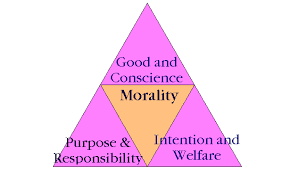 This is a good picture, IMO. It illustrates the factors that go into making a ‘moral’ choice. What is my intention? What is my purpose and responsibility in this situation? How will my actions affect others? What does my conscience tell me is the right thing to do? It is these types of self-evaluating questions that are essentially my guide to morality at this time. I suppose some of those foundations were formed early in my childhood and through religious training, but it certainly didn’t end there, nor does the Bible still guide my behaviour.
This is a good picture, IMO. It illustrates the factors that go into making a ‘moral’ choice. What is my intention? What is my purpose and responsibility in this situation? How will my actions affect others? What does my conscience tell me is the right thing to do? It is these types of self-evaluating questions that are essentially my guide to morality at this time. I suppose some of those foundations were formed early in my childhood and through religious training, but it certainly didn’t end there, nor does the Bible still guide my behaviour.
One thing that I personally disagree with is the assertion that the Bible is a good dictator of morality. In my opinion, the Bible is full of ‘holy’ actions that are absolutely counter to my sense of morally justified behaviour. For example, I can, without reservation, say that the sacrifice of children is morally wrong, and even the Bible seems to support that stance in the stark condemnation of child-sacrifice by so-called pagan religions of the time {to Ba’al (2 Kings 17:16-17) and to Molech (Leviticus 18:21)}. However, I find it hypocritical to then require the same of his own people, which is evidenced by the numerous accounts of child sacrifice in the Bible {Isaac (Genesis 22:2), Samuel (1 Samuel 1:11; 21-28), all the firstborn children of Egypt (Exodus 13:15), Jephthah’s daughter (Judges 11:30-40), Lot’s daughters (Genesis 19:1-8), Jesus – to name a few}).
I see no difference; either it’s wrong, or it’s acceptable. And that’s only one example. There are many such moral inconsistencies in the Bible, however, I feel confident in rejecting it as a moral authority based on that one, glaring inconsistency.
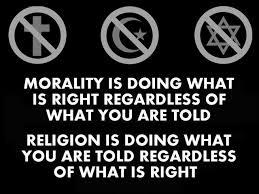 This is another point that I think is valid in the question of morality. I think that the indoctrination of many religions tends to eliminate the need or desire for independent thought. Even some religions flat-out discourage ‘independent thought’ from the pulpit. I don’t see how ceasing to think for yourself about your actions could ever be a good thing. As a morally upstanding person, it is my moral obligation to mindfully consider how my actions affect those around me. It is my moral obligation to consider how my actions and lifestyle affect the earth. It is my moral obligation to think – to gather information, to never feel like my education is complete, to always be aware of my attitudes and mindfully act on them. These are the actions of a morally upstanding and ethical person. Eliminating the ‘thinking’ step in favor of blindly following the ‘ethics’ of a religious doctrine leads to many of the prejudicial issues we see in today’s society.
This is another point that I think is valid in the question of morality. I think that the indoctrination of many religions tends to eliminate the need or desire for independent thought. Even some religions flat-out discourage ‘independent thought’ from the pulpit. I don’t see how ceasing to think for yourself about your actions could ever be a good thing. As a morally upstanding person, it is my moral obligation to mindfully consider how my actions affect those around me. It is my moral obligation to consider how my actions and lifestyle affect the earth. It is my moral obligation to think – to gather information, to never feel like my education is complete, to always be aware of my attitudes and mindfully act on them. These are the actions of a morally upstanding and ethical person. Eliminating the ‘thinking’ step in favor of blindly following the ‘ethics’ of a religious doctrine leads to many of the prejudicial issues we see in today’s society.
So how and where has this sense of morality been developed? Largely through trial and error. Through experience. Through education. Through gut feeling. From all around me. A young child starts forming moral attitudes when they are very young – the first time a toy was snatched away from them, they learn about justice, and hopefully, have parents or other mindful caregivers who start shaping those attitudes. We, as a society, could not live without some innate sense of morality; of what is just and fair and right. Some say that ‘God’ put those feelings there, but even in cultures where the God of the Bible is unknown, they still have ethical guidelines that they live by. I don’t believe that we, as a society, could have evolved to the point we are now without some sense of good for the community/society we live in. My morality is shaped by things I see and experience on a daily basis.
How do I teach my children about morality/ethics? Through the same way I learned – trial and error. When they make decisions, we examine how those decisions and actions have impacted our lives and that of those around us. We consider alternatives? Should we make a different choice? Do we need to take some further action? Was this the right thing to do? Through education – as I write this, for example, it is Columbus Day. I, personally, do not feel that Christopher Columbus is a figure to be celebrated. Not only did he not do that which he is credited for, he was not a man of upstanding moral character – he literally made his way in the world by slaughtering and enslaving thousands of people. Not only that, but his actions led to the further slaughter of hundreds of thousands of Native Americans – their culture was decimated by a series of events that began with Christopher Columbus’ actions. I have taken a moral position against continuing to indoctrinate my children into this ‘great American myth’ in favor of education about the facts surrounding the myth; and remembering those who were victims of his actions. The education process plays a huge role in developing a sense of ethical and morally upstanding behaviour.
I also believe that there are principles and concepts that we can agree make for a better society – things like honesty, respect, perseverance, charity, responsibility, acting with good intent… these are concepts that govern my actions and thoughts.
Resources for parents:
Raven:
I was raised as a Christian, so I feel like I got some of my early moral and ethical foundations there, but then it evolved. Once I began to read and learn more about my religion, I found that the actual teachings of the church differed greatly from what was taught to me. Eventually my moral/ethic code moved more to humanism and different pagan ethics. By pagan ethics I mean having respect for nature and creatures of nature. For example, I do not believe in killing animals just for trophies. I believe if you are going to kill an animal it should be for food or out of protection for yourself. Also I do try and follow the Nine Noble Virtues.
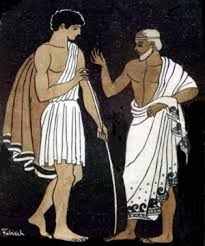 I believe that many issues that deal with morals or ethics need to be looked at as a whole; each individual situation needs to be debated and examined. I feel that, being an adult now and having more life experience, that I can usually figure out what is right or wrong. If not, then I seek the advice of many people in my life from family, friends, elders and even favorite teachers to try and figure out which is right or wrong. In this way, I feel that I achieve balance. I do my best to way the pros and cons of each situation from a philosophical and logical viewpoint as well.
I believe that many issues that deal with morals or ethics need to be looked at as a whole; each individual situation needs to be debated and examined. I feel that, being an adult now and having more life experience, that I can usually figure out what is right or wrong. If not, then I seek the advice of many people in my life from family, friends, elders and even favorite teachers to try and figure out which is right or wrong. In this way, I feel that I achieve balance. I do my best to way the pros and cons of each situation from a philosophical and logical viewpoint as well.
I also like a some Eastern Philosophy; Confucius, Buddha, etc. I try to live and let live and do my best to let Karma fulfill itself. I like how much of it looks inward and how it concentrates on balance in one self, the betterment of oneself, and to concentrate on yourself as the way to solve issues. For example it tells you to look inward first to see what your part is in the conflict and what you can do to resolve it.
I have my basic moral code but with more complex issues I examine them as they come up and will reevaluate them as my knowledge grows and my experiences change.
Bridey:
My morals & ethical code don’t come from my spiritual beliefs, they come from my parents. I was lucky enough to grow up with parents who allowed me the freedom to explore many different spiritual paths as a child, but before they sent me out in the world to explore they made sure that I knew certain things about how to behave and the difference between right and wrong. My dad was in the Navy and appreciated a sense of order and his expectation was that respect was earned, not freely given (despite age/status/position). Both my mom & dad taught my brother and I to respect them through love, not fear or power. We learned early on that dad was easier to make budge than mom when it came to what we wanted, but they were both fair for the most part. I don’t remember them sitting me down to tell me what was right and what was wrong, but I do remember living & learning as I went.

If I made a mistake, i.e.: was sassy to a great aunt or grandparent, they would correct me and explain what was and wasn’t acceptable and over time I came to appreciate praise over reprimands. I was taught to share with others, to help when asked, to be kind to others, not to use language around other adults that I wouldn’t with my parents, to listen without speaking, not to steal, not to lie, leave the land as I found it, treat animals with reverence and kindness, say please and thank you, keep my hands to myself, don’t give up, try… try again, admit when you’re wrong & apologize… you know, all those things most kids learn without really realizing they were learning them.
As an adult and as a witch, I reflect on the times my parents, other family members, teachers or friends taught me a life lesson and I realized that not much has changed. Those are the same things I still try to strive for in my life today.
Kindness. Respect. Honesty. Integrity. Reverence. Hospitality. Perseverance. Love. Personal-Accountability. Fairness.
In addition to those, there is a code of ethics that I abide by as a nurse. It deals with treating patients with dignity, practicing with respect & compassion, treating patients as equals despite socioeconomic status, race, religion, gender, sexual identity, etc., about being an advocate for the patient, protecting health, safety and rights of the patient, to practice competently, collaborating with nursing peers, ancillary staff, doctors and therapies when necessary on behalf of patients, represent nursing positively through articulating core nursing values & maintaining the integrity of the profession and practices.
I think about what kind of example I want to be to others in my personal and professional life, as well as in the greater community. While I know that some of what I have learned has shaped the kind of witch and nurse I am, that has more to do with where I came from than what I learned from the Craft.
Poppy:
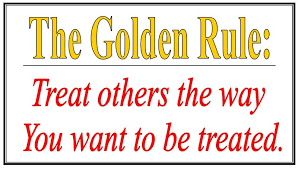
As a Pagan, I think morals and ethics can all boil down to the Golden Rule: we should treat others like we want to be treated. I also compare my ideas regarding morals and ethics to John Rawls’ ideas as presented in A Theory of Justice, specifically his “Justice as Fairness.” Rawls writes about political philosophy and ethics, attempting to merge equality and liberty.
One of the major tenets of his work is the idea that humans should enter into society blindly, having made their rules, policies, and assumptions about how society should work and how people should be treated without the foreknowledge of their place in society. Rawls calls this state a “veil of ignorance.” If individuals do not know their place in society, they will make the most balanced, mutually beneficial decisions regarding what constitutes a just society.
I think that these ideas can be extended to basic morals and ethics that we use on a daily basis. When deciding on how to treat others and how to behave within society, we must consider all aspects of our decisions and behaviors, including how they impact others. We will be the most moral and ethical if we consider how we would feel if the roles were reversed, which is admittedly a bit more difficult considering that we lack the benefit of complete objectivity. I think that morals and ethics come from an objective good, which can be described as a humanistic view of society.

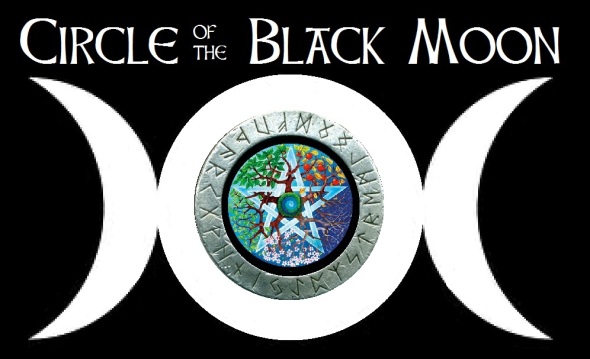



 the year, you’ll be washing clothes for the dead by year’s end.” Meaning that someone in your family, or someone you’re close to will die that year. When I was very little, we used to laundry at my grandmother’s house every Saturday, unless of course, Saturday fell on January 1st. In that case, she would actually give my mother money to go to the laundry mat on any other day but that one. My mom used to laugh about it and kind of imply that it was just a stupid superstition, but after my grandmother passed away, we never washed clothes on New Year’s Day again. I think Mom had washed something on the first that year, and it messed with her head. Whatever the case, she made sure to remind us to wash clothes a few days in advance every year after that, and because I don’t want to take any chances, even though it seems silly, I’ll never wash clothes on the first either.
the year, you’ll be washing clothes for the dead by year’s end.” Meaning that someone in your family, or someone you’re close to will die that year. When I was very little, we used to laundry at my grandmother’s house every Saturday, unless of course, Saturday fell on January 1st. In that case, she would actually give my mother money to go to the laundry mat on any other day but that one. My mom used to laugh about it and kind of imply that it was just a stupid superstition, but after my grandmother passed away, we never washed clothes on New Year’s Day again. I think Mom had washed something on the first that year, and it messed with her head. Whatever the case, she made sure to remind us to wash clothes a few days in advance every year after that, and because I don’t want to take any chances, even though it seems silly, I’ll never wash clothes on the first either.

